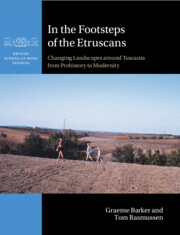Book contents
- In the Footsteps of the Etruscans
- British School at Rome Studies
- In the Footsteps of the Etruscans
- Copyright page
- Dedication
- Contents
- Figures
- Tables
- Contributors
- Preface and Acknowledgements
- 1 The Tuscania Archaeological Survey: Rationale, Aims and Objectives
- 2 Methodologies
- 3 The Natural Landscape and Its Evolution
- 4 Prehistoric Landscapes
- 5 Etruscan Urbanization, c. 700–300 bc
- 6 ‘Romanization’: The Roman Republican Period, c. 300–30 bc
- 7 The Roman Imperial and Late Antique Periods, c. 30 bc–c. ad 700
- 8 Incastellamento and Its Aftermath: Medieval and Modern Landscapes, c. ad 700 to the Present
- 9 A Mediterranean Landscape from Prehistory to Modernity
- Book part
- Bibliography
- Index
4 - Prehistoric Landscapes
Published online by Cambridge University Press: 12 October 2023
- In the Footsteps of the Etruscans
- British School at Rome Studies
- In the Footsteps of the Etruscans
- Copyright page
- Dedication
- Contents
- Figures
- Tables
- Contributors
- Preface and Acknowledgements
- 1 The Tuscania Archaeological Survey: Rationale, Aims and Objectives
- 2 Methodologies
- 3 The Natural Landscape and Its Evolution
- 4 Prehistoric Landscapes
- 5 Etruscan Urbanization, c. 700–300 bc
- 6 ‘Romanization’: The Roman Republican Period, c. 300–30 bc
- 7 The Roman Imperial and Late Antique Periods, c. 30 bc–c. ad 700
- 8 Incastellamento and Its Aftermath: Medieval and Modern Landscapes, c. ad 700 to the Present
- 9 A Mediterranean Landscape from Prehistory to Modernity
- Book part
- Bibliography
- Index
Summary
Though not prolific, our prehistoric material both significantly amplifies our knowledge of the prehistory of the study area and informs on wider debates about settlement trends prior to Etruscan urbanization.Palaeolithic finds were very sparse, but the area was occasionally visited by Mesolithic hunter-gatherers in the Early Holocene (9700-6200 BC) even though its volcanic soils were heavily wooded. The first farming communities (Earlier Neolithic, c.5500-4500 BC: 10 sites) consisted of small residential units of one or two households. The Later Neolithic (4500-3500 BC: 15 sites) data fit the regional evidence of increasing complexity and social inequality.Site numbers doubled in the Copper Age (3500-2200 BC: 30 sites) and doubled again in the Earlier Bronze Age (2200-1400 BC: 62 sites) but these societies remained small scale, living as individual households or in small clusters. The same rural structure continued into the Later Bronze Age (1400-950 BC: 53 sites) but above it Tuscania’s Colle San Pietro acropolis developed as a nucleated and probably defended hilltop community.The process of nucleation accelerated in the Iron Age (950-700 BC: 16 sites). Tuscania was probably in a subordinate relationship to Tarquinia, one of five ‘super-centres’ that developed into the major Etruscan cities of South Etruria.
Keywords
- Type
- Chapter
- Information
- In the Footsteps of the EtruscansChanging Landscapes around Tuscania from Prehistory to Modernity, pp. 85 - 129Publisher: Cambridge University PressPrint publication year: 2023

